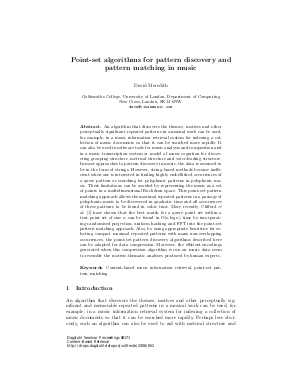Point-set algorithms for pattern discovery and pattern matching in music
Author David Meredith
-
Part of:
Volume:
Dagstuhl Seminar Proceedings, Volume 6171
Part of: Series: Dagstuhl Seminar Proceedings (DagSemProc) - License:
 Creative Commons Attribution 4.0 International license
Creative Commons Attribution 4.0 International license
- Publication Date: 2006-09-19
File

PDF
DagSemProc.06171.8.pdf
- Filesize: 0.73 MB
- 23 pages
Document Identifiers
Subject Classification
Keywords
- Content-based music retrieval
- point-set pattern matching
Metrics
- Access Statistics
-
Total Accesses (updated on a weekly basis)
0Document
0Metadata
Abstract
An algorithm that discovers the themes, motives and other perceptually significant repeated patterns in a musical work can be used, for example, in a music information retrieval system for indexing a collection of music documents so that it can be searched more rapidly. It can also be used in software tools for music analysis and composition and in a music transcription system or model of music cognition for discovering grouping structure, metrical structure and voice-leading structure. In most approaches to pattern discovery in music, the data is assumed to be in the form of strings. However, string-based methods become inefficient when one is interested in finding highly embellished occurrences of a query pattern or searching for polyphonic patterns in polyphonic music. These limitations can be avoided by representing the music as a set of points in a multidimensional Euclidean space. This point-set pattern matching approach allows the maximal repeated patterns in a passage of polyphonic music to be discovered in quadratic time and all occurrences of these patterns to be found in cubic time. More recently, Clifford et al. (2006) have shown that the best match for a query point set within a text point set of size n can be found in O(n log n) time by incorporating randomised projection, uniform hashing and FFT into the point-set pattern matching approach. Also, by using appropriate heuristics for selecting compact maximal repeated patterns with many non-overlapping occurrences, the point-set pattern discovery algorithms described here can be adapted for data compression. Moreover, the efficient encodings generated when this compression algorithm is run on music data seem to resemble the motivic-thematic analyses produced by human experts.
Cite As Get BibTex
David Meredith. Point-set algorithms for pattern discovery and pattern matching in music. In Content-Based Retrieval. Dagstuhl Seminar Proceedings, Volume 6171, pp. 1-23, Schloss Dagstuhl – Leibniz-Zentrum für Informatik (2006)
https://doi.org/10.4230/DagSemProc.06171.8
BibTex
@InProceedings{meredith:DagSemProc.06171.8,
author = {Meredith, David},
title = {{Point-set algorithms for pattern discovery and pattern matching in music}},
booktitle = {Content-Based Retrieval},
pages = {1--23},
series = {Dagstuhl Seminar Proceedings (DagSemProc)},
ISSN = {1862-4405},
year = {2006},
volume = {6171},
editor = {Tim Crawford and Remco C. Veltkamp},
publisher = {Schloss Dagstuhl -- Leibniz-Zentrum f{\"u}r Informatik},
address = {Dagstuhl, Germany},
URL = {https://drops.dagstuhl.de/entities/document/10.4230/DagSemProc.06171.8},
URN = {urn:nbn:de:0030-drops-6525},
doi = {10.4230/DagSemProc.06171.8},
annote = {Keywords: Content-based music retrieval, point-set pattern matching}
}
